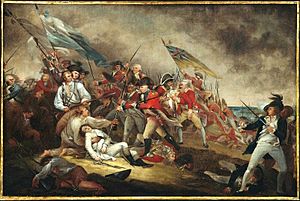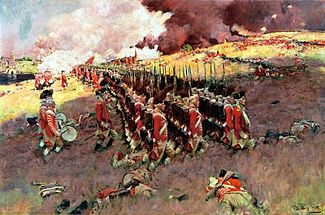Battle of Bunker Hill facts for kids
Quick facts for kids Battle of Bunker Hill |
|||||||||
|---|---|---|---|---|---|---|---|---|---|
| Part of the American Revolutionary War | |||||||||
 Death of General Warren at the Battle of Bunker Hill by John Trumbull |
|||||||||
|
|||||||||
| Belligerents | |||||||||
| Commanders and leaders | |||||||||
| Strength | |||||||||
| ~2,400 | 3,000+ | ||||||||
| Casualties and losses | |||||||||
| 115 killed, 305 wounded, 30 captured (20 POWs died) Total: 450 |
19 officers killed 62 officers wounded 207 soldiers killed 766 soldiers wounded Total: 1,054 |
||||||||
The Battle of Bunker Hill was fought on Saturday June 17, 1775 during the Siege of Boston in the first stage of the American Revolutionary War. The battle is named after Bunker Hill in Charlestown, Massachusetts, which was peripherally involved in the battle. It was the original objective of both the colonial and British troops, though the majority of combat took place on the adjacent hill which later became known as Breed's Hill.
On June 13, 1775, the leaders of the colonial forces besieging Boston learned that the British were planning to send troops out from the city to fortify the unoccupied hills surrounding the city, which would give them control of Boston Harbor. In response, 1,200 colonial troops under the command of William Prescott stealthily occupied Bunker Hill and Breed's Hill. During the night, the colonists constructed a strong redoubt on Breed's Hill, as well as smaller fortified lines across the Charlestown Peninsula.
By daybreak of June 17, the British became aware of the presence of colonial forces on the Peninsula and mounted an attack against them that day. Two assaults on the colonial positions were repulsed with significant British casualties; the third and final attack carried the redoubt after the defenders ran out of ammunition. The colonists retreated over Bunker Hill, leaving the British in control of the Peninsula.
The battle was a tactical, though somewhat Pyrrhic, victory for the British, as it proved to be a sobering experience for them; the British incurred many more casualties than the Americans had sustained, including many officers. The battle had demonstrated that inexperienced militia were able to stand up to regular army troops in battle. Subsequently, the battle discouraged the British from any further frontal attacks against well defended front lines. American casualties were comparatively much fewer, although their losses included General Joseph Warren and Major Andrew McClary, the final casualty of the battle.
The battle led the British to adopt a more cautious planning and maneuver execution in future engagements, which was evident in the subsequent New York and New Jersey campaign, which arguably helped rather than hindered the American forces, as their new approach to battle was actually giving the Americans greater opportunity to retreat if defeat was imminent. The costly engagement also convinced the British of the need to hire substantial numbers of Hessian auxiliaries to bolster their strength in the face of the new and formidable Continental Army.
Interesting facts about the Battle for Bunker Hill

- Most of the battle wasn't actually fought on Bunker Hill but Breed’s Hill just to the south.
- Major John Simpson (December 1, 1748 – October 28, 1825) was an American Revolutionary War soldier who was one of several men described as having fired the first shot on the American side at the Battle of Bunker Hill.
- 1,054 redcoats (British soldiers) died at Bunker Hill.
- The reason the British won the battle was because the colonists ran out of ammunition and gunpowder.
- The colonists used muskets and guns and the British used muskets and bayonets.
- Even though the colonists lost it gave them a sense of hope and made them feel they were capable of beating the British.
Images for kids
-
Bunker Hill clipper ship
-
Statue of William Prescott in Charlestown, Massachusetts
See also
 In Spanish: Batalla de Bunker Hill para niños
In Spanish: Batalla de Bunker Hill para niños










